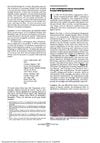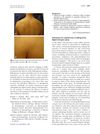466 citations,
June 2009 in “Experimental dermatology” We now understand more about what causes acne and this could lead to better, more personalized treatments.
[object Object]  4 citations,
December 2021 in “The journal of investigative dermatology/Journal of investigative dermatology”
4 citations,
December 2021 in “The journal of investigative dermatology/Journal of investigative dermatology” Overactive Wnt signaling in mouse skin stem cells causes acne-like cysts and shrinking oil glands, which some treatments can partially fix.
3 citations,
August 2020 in “Animals” Researchers found a way to grow cashmere goat hair cells in a lab and discovered that certain conditions improve these cells' growth and characteristics.
1 citations,
January 2018 in “Indian Journal of Dermatology/Indian journal of dermatology” Retinoids might cause temporary hyperthyroidism in some patients.
6 citations,
December 1987 in “Mayo Clinic proceedings” Retinoids are effective for severe acne and psoriasis but can cause serious side effects and birth defects.
14 citations,
March 2019 in “European journal of pharmaceutics and biopharmaceutics” Proretinal nanoparticles improve skin absorption and reduce irritation of topical retinoids.
8 citations,
March 2011 in “Endocrine” A new gene mutation causes vitamin D-resistant rickets and hair loss in two siblings.
1 citations,
November 2022 in “International journal of trichology” A girl with a rare skin condition improved after one month of treatment with acitretin.
136 citations,
April 2010 in “British Journal of Dermatology” Acitretin is effective for severe skin conditions but has significant side effects and requires careful monitoring.
67 citations,
December 2013 in “Journal of Biological Chemistry” SCD1 is crucial for skin health and overall energy balance.
 November 2024 in “Medicina”
November 2024 in “Medicina” Recognizing scalp symptoms in PRP is crucial for proper diagnosis and treatment.
18 citations,
July 2016 in “Clinics in dermatology” Nutrition affects skin health differently based on age and condition.
[object Object]  6 citations,
November 1996 in “Archives of Dermatology”
6 citations,
November 1996 in “Archives of Dermatology” A man's relapsed leprosy was successfully treated with the antibiotic sparfloxacin.
 January 2017 in “Clinical approaches and procedures in cosmetic dermatology”
January 2017 in “Clinical approaches and procedures in cosmetic dermatology” Retinoids are effective for skin conditions like severe acne and psoriasis but must be used with caution due to potential side effects and risks during pregnancy.
 1 citations,
April 2018 in “Journal of Investigative Dermatology”
1 citations,
April 2018 in “Journal of Investigative Dermatology” Fzd2 is important for skin and hair development through various signaling ways.
 April 2018 in “Journal of Investigative Dermatology”
April 2018 in “Journal of Investigative Dermatology” Older hair follicle stem cells have a reduced ability to renew themselves, leading to more hair loss.
 April 2018 in “Journal of Investigative Dermatology”
April 2018 in “Journal of Investigative Dermatology” Both Th1 and Th2 immune responses are increased in alopecia areata, with Th2 response more strongly linked to how severe the disease is.
 April 2018 in “Journal of Investigative Dermatology”
April 2018 in “Journal of Investigative Dermatology” Activating Nrf2 helps wounds heal faster by increasing hair follicle stem cells.
 April 2018 in “Journal of Investigative Dermatology”
April 2018 in “Journal of Investigative Dermatology” Topical tofacitinib is effective in promoting hair growth for non-scarring alopecia.
 175 citations,
April 1982 in “Journal of The American Academy of Dermatology”
175 citations,
April 1982 in “Journal of The American Academy of Dermatology” Isotretinoin is highly effective in treating severe acne, rosacea, and gram-negative folliculitis.
 December 2015 in “Dermatologic Therapy”
December 2015 in “Dermatologic Therapy” Zinc sulfate solution is more effective than tea lotion for treating acne rosacea.
 September 1997 in “Journal of The European Academy of Dermatology and Venereology”
September 1997 in “Journal of The European Academy of Dermatology and Venereology” New treatment improves male hair loss.
 30 citations,
April 1990 in “Clinical Pharmacology & Therapeutics”
30 citations,
April 1990 in “Clinical Pharmacology & Therapeutics” Tretinoin cream boosts minoxidil absorption, possibly improving hair loss treatment.
 15 citations,
October 2006 in “Journal of the American Academy of Dermatology”
15 citations,
October 2006 in “Journal of the American Academy of Dermatology” Liquid nitrogen spray caused a temporary, harmless swelling under the skin in an elderly woman.
 1 citations,
March 2011 in “Informa Healthcare eBooks”
1 citations,
March 2011 in “Informa Healthcare eBooks” Isotretinoin is a preferred treatment for severe acne, often leading to long-term improvement, but requires careful monitoring due to potential side effects.

 109 citations,
October 2007 in “Journal of pineal research”
109 citations,
October 2007 in “Journal of pineal research” Melatonin helps regulate hair growth and protects the hair follicle from stress.
 47 citations,
September 2016 in “Reviews in endocrine and metabolic disorders”
47 citations,
September 2016 in “Reviews in endocrine and metabolic disorders” The skin's ability to produce hormones is linked to various skin conditions, and better understanding this process could lead to new treatments.
 45 citations,
August 2005 in “Bioorganic & medicinal chemistry”
45 citations,
August 2005 in “Bioorganic & medicinal chemistry” New compounds with carborane showed anti-androgen effects similar to flutamide.
 38 citations,
November 2012 in “Expert Opinion on Drug Safety”
38 citations,
November 2012 in “Expert Opinion on Drug Safety” Common acne treatments can cause various side effects, like skin irritation and more serious issues, but combination therapies are often more effective and better tolerated.



















